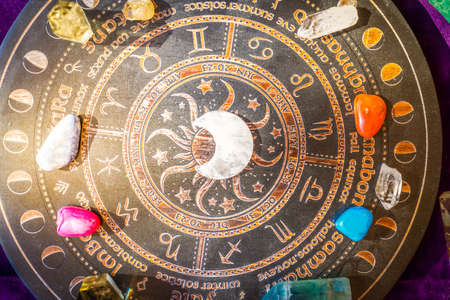Celestial Influences: Jupiter and Uranus in Astrological Tradition
Within the rich tapestry of astrological tradition, the planets Jupiter and Uranus have long occupied a pivotal role in shaping our understanding of social interactions, group dynamics, and the evolving nature of friendship. Jupiter, often hailed as the ‘Greater Benefic,’ embodies expansion, generosity, and philosophical growth. In British astrological circles, Jupiter is frequently associated with convivial gatherings — from the conviviality of a local pub to the intellectual camaraderie found within academic societies. It is this planet’s jovial influence that encourages the broadening of social networks, fostering inclusivity and a spirit of shared optimism amongst groups.
Uranus, by contrast, represents innovation, disruption, and the spark of individuality. Its discovery during the Enlightenment era — a period steeped in British scientific inquiry and revolutionary thought — symbolises its connection to sudden change and progressive ideals. Within the context of friendship and social networks, Uranus is often seen as the catalyst for unconventional alliances and the breaking down of traditional boundaries. British group dynamics, famed for their balance between tradition and eccentricity, are thus subtly shaped by these Uranian impulses towards novelty and reform.
Together, Jupiter and Uranus set the stage for a uniquely British approach to friendship: one that honours established rituals while remaining open to innovation. Whether in the close-knit bonds formed over centuries-old traditions or in the vibrant communities emerging around new ideas, these celestial bodies invite us to consider how expansion (Jupiter) and revolution (Uranus) coalesce within our social lives. The interplay between them can be discerned in everything from grassroots activism to the quietly radical inclusivity often celebrated within British society.
British Social Networks: Custom, Convention, and Community
Within the British Isles, social networks have long thrived on a subtle interplay of custom and convention. The fabric of group dynamics here is stitched with threads of etiquette, understated ritual, and a distinctive preference for collective belonging. Unlike the more spontaneous or effusive modes found elsewhere, British group interaction often unfolds through carefully moderated exchanges and a marked respect for personal space. This distinctive approach is not mere reticence but rather an evolved system that allows individuals to navigate complex social terrains with grace and predictability.
The Role of Etiquette in Group Dynamics
Etiquette serves as both shield and bridge in British society. Whether among old friends or newly acquainted colleagues, unspoken rules guide everything from conversational topics (polite weather chat is never out of place) to the choreography of introductions and leave-takings. Over-familiarity is typically eschewed in favour of measured warmth and good-humoured banter, ensuring that all feel included without the risk of social overreach. This careful balance preserves harmony within groups while allowing for subtle displays of individuality—echoing Uranian unpredictability contained within Jupiterian order.
Clubs, Societies, and the Pub: Quintessential Social Arenas
The enduring institutions of clubs, societies, and especially the pub form the backbone of British group life. Each provides a unique microcosm where bonds are forged and maintained according to shared interests or locality:
| Institution | Purpose | Social Function |
|---|---|---|
| Private Clubs | Exclusive membership; common interest or profession | Networking, tradition, continuity |
| Societies & Associations | Cultural, academic, or hobby-based gatherings | Community building, intellectual exchange |
| The Pub | Local public house; open to all adults | Informal camaraderie, relaxation, local identity |
The Pub as Social Hearth
No discussion would be complete without mention of the public house—the “local.” Here, boundaries between strangers blur as conversation flows over pints and laughter rises above the hum of everyday life. The pub’s informal atmosphere provides fertile ground for spontaneous connections and enduring friendships alike. In this setting, Jupiterian inclusivity mingles with Uranian flashes of originality: one might find themselves drawn into lively debate with a regular or forging an unlikely alliance over a shared quiz team victory.
Navigating Group Entry and Belonging
For newcomers, joining these established circles can be daunting. Yet perseverance coupled with observance of local custom—such as buying ones round at the bar or displaying gentle self-deprecation—often secures acceptance in time. British group dynamics thus reflect a delicate dance between tradition and innovation: while rooted in long-standing forms, they remain open to those who appreciate their subtleties.

3. Jupiter’s Jovial Bond: Generosity and Social Cohesion in the British Context
Within the astrological tradition, Jupiter stands as the grand benefactor—a symbol of generosity, wisdom, and social connectedness. These archetypal qualities find a distinctive echo in the fabric of British group life, where subtle codes of loyalty and mutual support underpin both formal institutions and informal gatherings. From bustling rugby clubs to the timeless rituals of the village fête, Jupiter’s jovial spirit manifests in ways that are at once ancient and thoroughly contemporary.
The British penchant for camaraderie is more than mere sociability; it is a cultivated art of inclusion, guided by unspoken rules of fair play and communal responsibility. On the rugby pitch, for instance, players not only strive for victory but also embody values of teamwork, respect for adversaries, and unwavering loyalty to their side. Here, Jupiter’s expansive nature is mirrored in the willingness to share triumphs and setbacks alike, weaving a tapestry of trust that outlasts any single match.
In rural communities and urban enclaves alike, the local fête or charity event becomes a microcosm of Jupiterian generosity. Neighbours pool their talents and resources—baking cakes, tending stalls, organising raffles—not solely for personal gain but to nourish a collective spirit. These seemingly modest acts form the invisible bonds that sustain British society through adversity and change.
Mentorship, too, is steeped in Jupiter’s wisdom. Whether it is an experienced publican guiding a novice behind the bar or an elder offering advice to newcomers at a local society meeting, the transfer of knowledge is conducted with warmth and patience. This tradition affirms belonging while upholding high standards of integrity—another quiet testament to Jupiter’s enduring influence on British group dynamics.
Such patterns are not relics of a vanished past but living traditions constantly renewed in football terraces, university common rooms, and online forums devoted to every conceivable interest. The British embrace of group solidarity—tempered by wit and restraint—demonstrates how Jupiterian ideals can thrive even amidst social complexity and modern individualism.
Ultimately, Jupiter’s archetype infuses British friendship networks with an ethos that prizes openness without ostentation. Through countless small gestures—offering a round at the pub, lending a sympathetic ear after defeat, or simply “mucking in” when needed—the spirit of generosity becomes woven into the very DNA of British group life, forging connections as enduring as any star in the night sky.
4. Uranus and the Spark of Innovation: Eccentricity and Subversion in Friendship
In the astrological theatre, Uranus stands as the unpredictable maverick—a planet whose energies generate disruption, originality, and the breaking of boundaries. Within the British context, these Uranian qualities have often found fertile ground, nurturing not only individual eccentricity but also collective movements that challenge the status quo of friendship and social networks. British culture has long harboured a quiet affection for the unconventional, whether expressed through the peculiar rituals of university societies or the deliberate oddities of figures such as Oscar Wilde or Quentin Crisp. This embrace of eccentricity is more than mere whimsy; it forms a crucible where innovative social bonds are forged.
The Uranian Social Pulse: Fostering Unconventional Connections
Unlike Jupiter’s expansive cohesion, Uranus shakes up established circles with electric unpredictability. Friendships formed under its influence are often marked by suddenness and shared rebellion—alliances born not out of similarity, but out of a mutual desire to transcend traditional group limitations. The very fabric of British group dynamics owes much to these Uranian surges. Consider the Bloomsbury Group in early 20th-century London: writers, artists, and philosophers who defied Victorian morality by weaving their own web of relationships across gender and class boundaries. Their gatherings were less about conformity than about creative subversion.
From Bloomsbury to Modern Movements: Evolution Through Eccentricity
This Uranian legacy persists into contemporary Britain, visible in everything from punk collectives to digital activist networks. These groups disrupt hierarchical orderings, preferring horizontal structures that allow for rapid innovation and collective agency. At each historical juncture, Uranian energy has animated new forms of friendship—those based on shared ideals rather than inherited ties.
British Eccentricity in Social Networks: Key Examples
| Movement/Group | Era | Uranian Features |
|---|---|---|
| Bloomsbury Group | Early 1900s | Fluid relationships, intellectual subversion |
| Punk Collectives | 1970s-80s | Anti-establishment ethos, creative chaos |
| LGBTQ+ Activism | Late 20th Century-present | Boundary-breaking alliances, advocacy for radical inclusion |
| Digital Activist Networks | 2000s-present | Non-hierarchical organisation, viral mobilisation |
The persistence of such groups illustrates how British society continually reimagines its social architecture through a Uranian lens. Eccentric friendships become engines for cultural transformation, enabling individuals to navigate and reshape group boundaries. In this manner, Uranus does not merely disrupt—it electrifies, ensuring that British social networks remain sites of perpetual renewal and daring innovation.
5. Astrological Cycles and the Flux of British Social Groups
The intricate web of British social groups is far from static; it ebbs and flows in rhythm with the larger cosmic cycles, particularly those governed by Jupiter and Uranus. These planetary cycles, deeply embedded in astrological tradition, offer a compelling lens through which to examine the periodic rise and fall of friendships and networks throughout Britain’s history. Jupiter, heralding expansion and optimism, tends to coincide with periods where inclusivity flourishes—think of eras marked by community-driven initiatives, burgeoning charitable societies, or the broadening acceptance of diverse identities within quintessentially British institutions.
Conversely, Uranus—symbolising sudden change and rebellion against the status quo—often triggers moments when traditional group structures are challenged or redefined. The swinging sixties in Britain, with its unprecedented social liberation and upheaval of old class boundaries, stand as a testament to Uranian disruption. In these times, longstanding friendships may fracture, only to reform around new ideals and shared visions for the future.
This astrological interplay mirrors broader societal trends: when Jupiter’s influence is prominent, there is a palpable shift towards openness and collective belonging. We observe more inclusive gatherings at local pubs, expanded membership in clubs once considered exclusive, and an overall willingness to embrace outsiders into established circles. In contrast, Uranian cycles often see social groups fragmenting or realigning themselves along new lines, sometimes leading to the formation of entirely novel communities that reflect the changing values of contemporary Britain.
Yet, these cycles do not act in isolation; rather, they interact with the unique fabric of British society—a tapestry woven from centuries of tradition yet ever receptive to innovation. Thus, as astrology suggests, the evolution of friendship networks here is less a linear progression than a series of nuanced oscillations between tradition and transformation. This cyclical movement ensures that while some aspects of British group dynamics remain rooted in history, others are constantly refreshed by the tides of time.
6. Contemporary Reflections: Friendship, Technology, and British Identity
In the ever-evolving landscape of British society, the threads of friendship and social networks are continually rewoven by technological innovation and shifting cultural expectations. To view this modern tapestry through the dual astrological prisms of Jupiter and Uranus is to appreciate both the enduring quest for meaningful connection and the appetite for novelty and reinvention.
Jupiterian Expansion in Digital Britain
Jupiter, emblematic of growth, optimism, and community, finds new expression within the UK’s digital forums and virtual gatherings. British friendships—once forged in pubs, village greens, or university common rooms—now often begin or flourish on platforms like WhatsApp groups, Facebook communities, or even local Nextdoor networks. These spaces encourage inclusivity and collective spirit while echoing Britain’s tradition of club culture and civic association. The ease with which Britons can now maintain far-flung connections exemplifies a Jupiterian expansion of social horizons, transcending geography without sacrificing the warmth of shared values or banter.
The Uranian Impulse: Innovation and Individuality
Yet Uranus, planet of sudden change and radical individuality, also shapes contemporary British group dynamics. Social media’s rapid-fire connectivity enables spontaneous alliances—flash mobs, activist campaigns, viral challenges—that mirror Uranian unpredictability. In a nation celebrated for both its eccentricities and its traditions, online environments have become playgrounds for self-expression; identities can be curated with wit and irony, allowing Britons to balance the pull of belonging with the need for authenticity. The rise of niche communities—be it queer book clubs on Instagram or regional heritage pages—demonstrates how Uranian forces disrupt old hierarchies while catalysing new forms of kinship.
Cultural Mores and Changing Friendships
British friendship has long been characterised by subtlety—a dry humour here, a reserved gesture there—but digital communication sometimes erodes these nuances. Emoji-laden texts replace sotto voce asides; memes substitute for the ritualistic exchange of jokes at the pub. Nevertheless, technology also offers new rituals: scheduled Zoom quizzes during lockdowns, or coordinated fundraising efforts for local causes. As traditional markers shift, British identity adapts—not abandoning its roots in loyalty and understatement but weaving them into novel formats.
The Synthesis: Networks as Living Organisms
Viewed from both Jupiterian (community-building) and Uranian (innovation-seeking) lenses, contemporary British social networks resemble living organisms—adaptable yet grounded in shared mythologies. Whether maintaining school friendships across decades via group chats or forging quick bonds over common interests in Reddit threads, Britons continue to negotiate belonging within an increasingly interconnected yet fragmented world.
Thus, as technology accelerates and cultural mores evolve, the quintessentially British approach to friendship remains paradoxical: both steadfastly familiar and exhilaratingly new. The dynamic interplay between Jupiter’s expansive collegiality and Uranus’s disruptive creativity ensures that British social life endures not in spite of change but because of it—a testament to a nation’s ability to honour tradition whilst embracing innovation.


